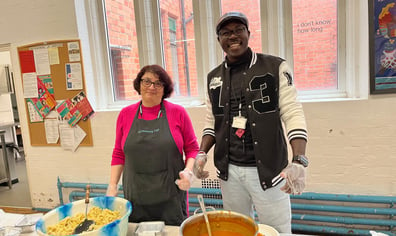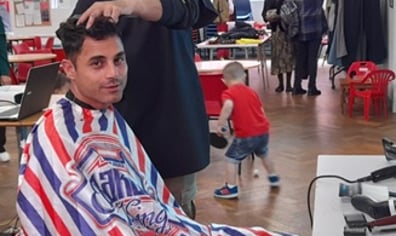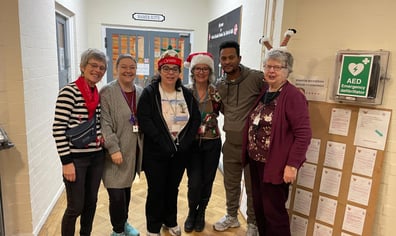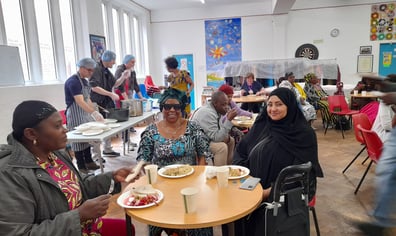About us
Who we are
WHAT WE DO?
The Destitution Project (DP) is a dynamic and well-respected charity at the forefront of refugee and asylum seeker support in Bolton, Greater Manchester. We have been offeing a broad range of support to those who may otherwise face destitution since 2015.
Our Wednesday Drop-in offers a safe, welcoming space for people to meet and mix. We provide a hot meal; food parcels for asylum seekers; English classes, clothing and household goods and much more. Our Casework Service provides information and support face to face at the Drop-in and remotely through the week to first time asylum applicants; refugees newly granted Leave to Remain and refused asylum seekers.
Our service is delivered by a passionately committed team of three staff members (part-time) and a volunteer core of thirty including 6 trustees. A few of the Team have been with the Project since its foundation as an independent charity in 2015; others have joined along the way, some having initially come to DP as service users themselves. People with lived experience are central to everything we do, not just as service users, but as staff, volunteers and trustees.
We received the Queen's Award for Voluntary Service in 2020.
Our culture and values
Our motto - Dignity and Hope for Asylum Seekers and Refugees - the main aim that all our work aspires to work towards.
We are a small Charity and one where we depend heavily on volunteer support for the work we do and small grant funders and individual donations to keep making that work possible. Our approach is one of participation and inclusion. We encourage service users to come on board as Helpers or Volunteers. We learn by experience and collaborate with other charities and organisations to help learn from others as well.
Wednesday Drop-in.
Our Drop in offers a safe, welcoming space for people to meet and mix. We provide a hot nutritious meal (vegan to meet cultural requirements); all day tea and coffee; clothing and household goods; food parcels (asylum seekers only); a barber’s service; English lessons; arts and crafts and games (pool and table tennis).
Casework:
Our highly regarded Casework Service is focused on asylum seekers (including those who have been refused). We offer a face-to-face service on Wednesdays at the Drop-in and a remote service throughout the week. We provide information and support during the legal process, facilitate access to housing and welfare rights, healthcare and education and provide onward support post-decision.
The DP Team:
Staff:
- Our highly experienced Senior Caseworker who is a Level 1 Adviser registered with the Office of Immigration Services Commissioner (OISC) and has been with DP since 2015.
- Our Admin Assistant (who carries out casework admin and is part of the DP Admin team).
- Our Drop-in Assistant (our most recently created role and someone with lived experience as a refugee).
All our members of staff initially joined DP as volunteers and have demonstrated their commitment to DP over many years.
Volunteers and Helpers
We have thirty active volunteers and helpers, twelve of whom have lived experience. The Helper role is a recent initiative introduced in response to the many offers of help we receive from service users who are passionate about supporting DP but, due to circumstances, cannot always offer the weekly commitment needed. Nonetheless Helpers are key to our service provision and, as circumstances allow, some do join as volunteers. To make sure that language is not a barrier we make use of interpreters, both in house and professional, to explain policies and procedures. Inclusion and empowerment is central to everything we do. Our volunteers and helpers bring a wealth of skills and experience to DP and some use their time at DP as a stepping stone to further education or employment.
Funders and other supporters have often remarked on the range and quality of service we offer at the Drop-in given our relatively small membership, to which we say that without the commitment and hard work of our staff, volunteers and helpers it would not be possible.
DP’S Impact:
DP has been supporting asylum seekers and refugees living in Bolton since 2015. In the year ending March 2024, our Caseworker held 281 face-to-face appointments, 660 remote-support sessions and supported 170 other (walk in) queries. We gave out 1559 food parcels to asylum seekers including destitute) and £800 in supermarket vouchers. We recorded 2957 attendances at our Drop In (60 weekly average). On average 17 volunteers attended each session giving 6220 hours over the year.
Governance and Management
Strategic governance and direction is provided by a Board of Trustees numbering six, all with diverse backgrounds including business management, education, mental health, the voluntary sector and arts/culture, one of whom has lived experience as a refugee. Trustees also currently provide managerial oversight of Drop-in and Casework services working closely with the DP’s Coordinating committee (DPCC). The DPCC is made up of lead volunteers (our most experienced volunteers) from each of the service delivery areas, our senior caseworker and two trustees. It is responsible for the day to day running of the Drop-in.
We are always seeking to develop and improve the service we offer and we value feedback from service users and team members. We also welcome expertise from external agencies and are currently embarking on a project with the Cranfield consultancy to introduce Microsoft 365 in order to store and share information more securely, work on documents collaboratively and manage on-line meetings.
Equality, diversity and inclusion policy
The Destitution Project is committed to encouraging equality and diversity among our employees and volunteers and eliminating unlawful discrimination. The aim is for our team to be truly representative of all sections of society, and for each employee and volunteer to feel respected and able to give their best. The organisation, in providing services, is also committed to avoiding unlawful discrimination against the public.
Our Equality policy’s purpose is to:
- Provide equality, fairness and respect for all in our employment, whether temporary, part-time or full-time.
- Not unlawfully discriminate because of the Equality Act 2010 protected characteristics of age, disability, gender reassignment, marriage and civil partnership, pregnancy and maternity, race (including colour, nationality, and ethnic or national origin), religion or belief, sex (gender) and sexual orientation.
- Oppose and avoid all forms of unlawful discrimination. This includes in employment terms: pay and benefits, terms and conditions of employment, dealing with grievances and discipline, dismissal, redundancy, leave for parents, requests for flexible working, and selection for employment, promotion, training or other developmental opportunities. However, in the matter of an offending background, a job or volunteer applicant’s criminal record history may prevent them being able to carry out specific roles within the charity.
The Destitution Project commits to:
- Encouraging equality and diversity in the workplace.
- Creating a working environment free of bullying, harassment, victimisation and unlawful discrimination, promoting dignity and respect for all, and where individual differences and the contributions of all the team are recognised and valued.
- Taking seriously complaints of bullying, harassment, victimisation and unlawful discrimination by employees, volunteers, suppliers, visitors, the public and any others in the course of the organisation’s work activities.
- Making opportunities for training, development and progress available to all employees and volunteers, who will be helped and encouraged to develop their full potential, so their talents and resources can be fully utilised to maximise the efficiency of the organisation.
- Decisions concerning employees and volunteers being based on merit (apart from in any necessary and limited exemptions and exceptions allowed under the Equality Act).
- Reviewing employment practices and procedures when necessary to ensure fairness, and also update them and the policy to take account of changes in the law.
- Monitoring the make-up of the team regarding information such as age, gender, ethnic background, sexual orientation, religion or belief, and disability in encouraging equality and diversity, and in meeting the aims and commitments set out in the equality policy.







